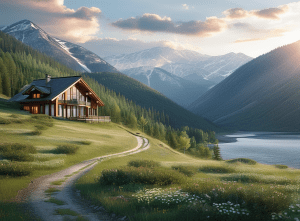A residential environment is not only closely related to people’s life but also indivisible space environment, and the traditional Chinese geomancy science, is China’s ancient cultural heritage and the accumulation of gathering geological geography, ecology, Landscape Architecture, architecture, ethics, esthetics to an integration and ancient Chinese architectural essence of the theory of learning.In the following content, we’ll cover all aspects of Feng Shui for homes, including wind, water, qi, the balance of yin and yang, and the role of greenery.
1.Elevate Your Home: A house should be higher than the street level. This is a basic Feng Shui principle for good energy flow. High-rise buildings are less affected by ground level issues like noise and light pollution, but these can still impact residents. Low ground levels can cause waterlogging and energy blockages, which is especially a concern for businesses.
2.Choose Flat Ground: For good Feng Shui, pick a house on even ground. A rugged terrain is bad for safety and career growth. Modern homes with uneven floors or pebble entrances might look stylish but can cause discomfort and accessibility issues.
3.Build Above, Not Below, a Slope: Homes should be on the higher end of slopes. Being above symbolizes progress, while being below can feel like a dead end. Opt for a spot with a clear view, even in lower-lying areas.
4.Face the Sun: A house should face the sun to avoid the shade. South-facing homes generally get the best light. Some designs might block sunlight, leaving interiors dark even if exterior walls are bright.
5.Avoid Valley Basins: These areas collect dirt and pollution, especially with today’s contamination risks. Valley winds and temperature changes trap pollutants, making it hard to live healthily in such areas. Go for slope locations, preferably sun-facing.
6.Keep Distance from Hills: Living too close to a hill can block your view and cause a sense of oppression, which is bad for your well-being and career. Build your home on a flat part of the hillside, not too close to the hill.

7.Don’t Be the Lone Crane: Don’t build your home at the peak of a mountain. It’s too isolated and exposed, like living too high where it’s cold. Temples are the only structures traditionally placed at mountain tops.
8.Embrace Sunlight: A home bathed in sunlight and fresh air is ideal according to modern Feng Shui. Daylighting is about having windows for natural light, while sunlight exposure is direct light coming through windows. South-facing homes are best for light. Lack of sunlight can weaken your immune system, especially for the old and young.
9.No Reflective Surfaces: Reflective surfaces like water near a house can cause flickering light and mental strain. It’s best to avoid such conditions to prevent disorientation and幻觉(hallucinations).
10Roads Should Be Simple and Smooth: Opt for homes on roads that are easy to navigate, with wide, flat sidewalks for pedestrian safety. Avoid narrow lanes and homes close to busy roads, as they can lead to a sense of unease and financial loss, known as “cutting feet water” in terms.
11.Select a Clean and Prosperous Area: Choose neighborhoods that are clean, quiet, and free from pollution and noise. Proximity to industrial zones or high-voltage lines can disrupt health and well-being, especially for children. The environment around your home impacts your quality of life.
12.Steer Clear of Railways: Living near railways can be disruptive due to noise and litter. Curved railways may also bring negative energy, or “sa,” to nearby homes. It’s advisable to avoid homes near railways, particularly for the elderly who are more sensitive to such disturbances.
13.Avoid Thunderstorm-Prone Areas: Feng Shui suggests homes should be positioned with natural protection like hills and trees, which can act as lightning rods. Ancient Chinese buildings have survived due to their resistance to natural disasters. Stay away from areas prone to lightning, such as groundwater outlets and damp areas.
14.Not Under Mountain Tails or Cliffs: Homes at the ends of mountains or valley mouths face risks of floods and landslides. These areas, where steep slopes meet flat land, can accumulate sand and soil, especially during floods, leading to ongoing danger and health concerns for residents.
15.Water in the Courtyard: Water symbolizes wealth and is essential. It’s best when it faces or embraces the home, like ponds or pools, enhancing energy and adding tranquility. Avoid water that flows away from the house, as it’s thought to take wealth with it.

16.Opt for Symmetrical Homes: Feng Shui favors square, symmetrical homes for balanced energy. If your home is irregular, use partitions to create balanced spaces, favoring light and airy solutions over solid walls.
17.Adequate Home Size: A home’s size should suit the number of residents to prevent conflicts or feelings of isolation. A general guideline is 50 square meters for a couple, 10 for a preschool child, 15 for school-age children, and 20 for university students and elderly.
18.Floor Element Harmony: Match the five elements of your home’s floor with your personal elements for good Feng Shui. Compatibility is key for harmony and luck.
19.Houses Should Dodge Windy Spots: For good Feng Shui, homes should shield from strong winds to keep positive energy. Too much wind, even in a great location, can disperse vital energy and wealth.
20.Avoid Jarring Structures: The surroundings of a home should be pleasant. Harsh mountain views or oddly shaped buildings nearby can disrupt the flow of energy and increase difficulties in life.
21.No Straight Roads Facing Your Home: Houses directly in line with long, busy roads are bad for Feng Shui. They’re like an “arrow” hitting your home. Use steps to reduce the impact.
22.Not at the End of the Road: Homes at the ends of roads or in cul-de-sacs can be risky. They’re vulnerable to attacks, strong winds, and have escape issues in emergencies. Always have an exit plan.
23.Not Right by the Road :While roads offer convenience, homes too close can face noise and safety issues. U-shaped road positions can offer stability, but outside that curve, it’s less secure.

